Bali may be a holiday destination but behind the scenes poverty and environmental problems exist. These NGOs in Bali have made it their mission look after the island they call home. We call them our Bali Heroes.
Whilst Bali puts on a ritzy front, the holiday destination is still home to many disadvantaged livelihoods that remain behind the scenes. Poverty in Bali is ongoing, primarily in the remote corners of the island where residents lack access to basic necessities; the ocean and beaches are garnering plastic pollutants; the education system requires rudimentary resources, and the list, frankly, goes on.
This layer of Bali is often neglected whether by lack of exposure or pure ignorance, but there are those that are actively fighting for the lives of the unseen, fighting to put them in the spotlight. For this reason, these heroes themselves deserve to be recognised for their courageous and selfless acts for the island we call home.
John Fawcett Foundation
Due to weak economic conditions and the lack of access to public health care, many Indonesians are needlessly blind or suffering from various eye problems. The Health Ministry of Indonesia found 2% of the Indonesian population is afflicted with visual impairments.

When John Fawcett moved to Bali and called it his new home, he recognised a dire need. He established a single vision to eradicate blindness and reduce its effect on the Indonesian population. The John Fawcett Foundation was founded in 1991 and has been treating the economically disadvantaged ever since. Its mission to identify and operate on as many Indonesian’s blinded by cataracts has found them travelling to far-flung places, deep into remote villages to locate people who are troubled by eye conditions. The services are facilitated by their mobile ophthalmic clinics, which resemble hospital operation rooms but are in bus form. Other than free surgery, JFF offers eye screenings, medicine, glasses, and corrective programmes for children. 2018 witnessed 50,750 patients screened, 3,457 eye surgeries, 29,051 glasses issued, and 121 prosthetic eyes made.
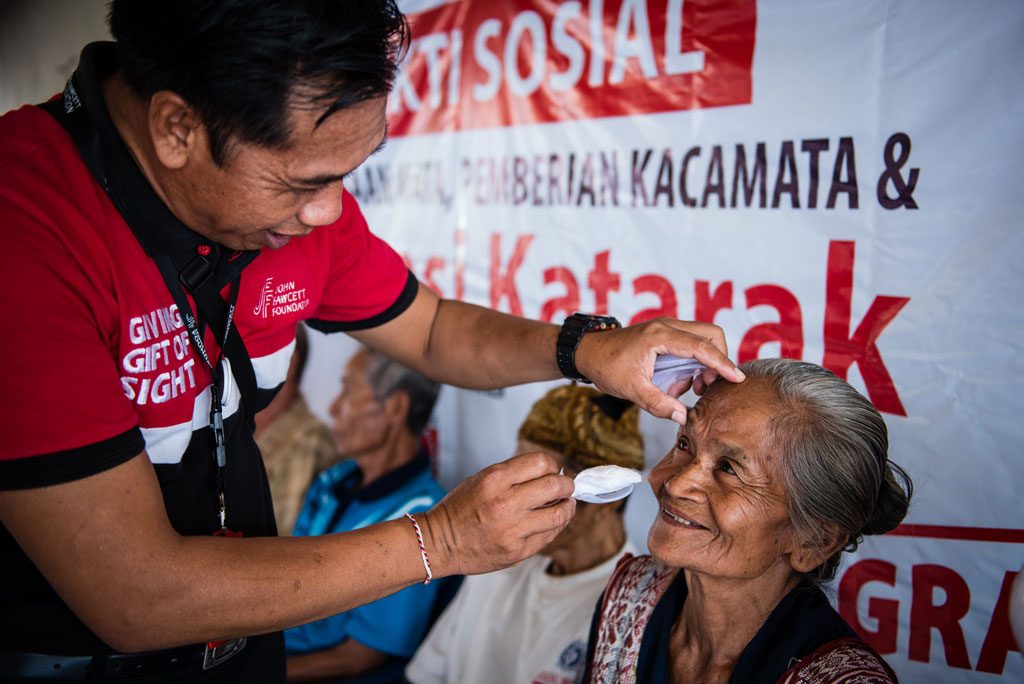
Bali Pink Ribbon
The lack of knowledge and public awareness has made many Indonesian women heedless of breast cancer. To prevent women from dying of breast cancer, early detection is necessary and encouraged, however, the services are hardly accessible in parts of the island.
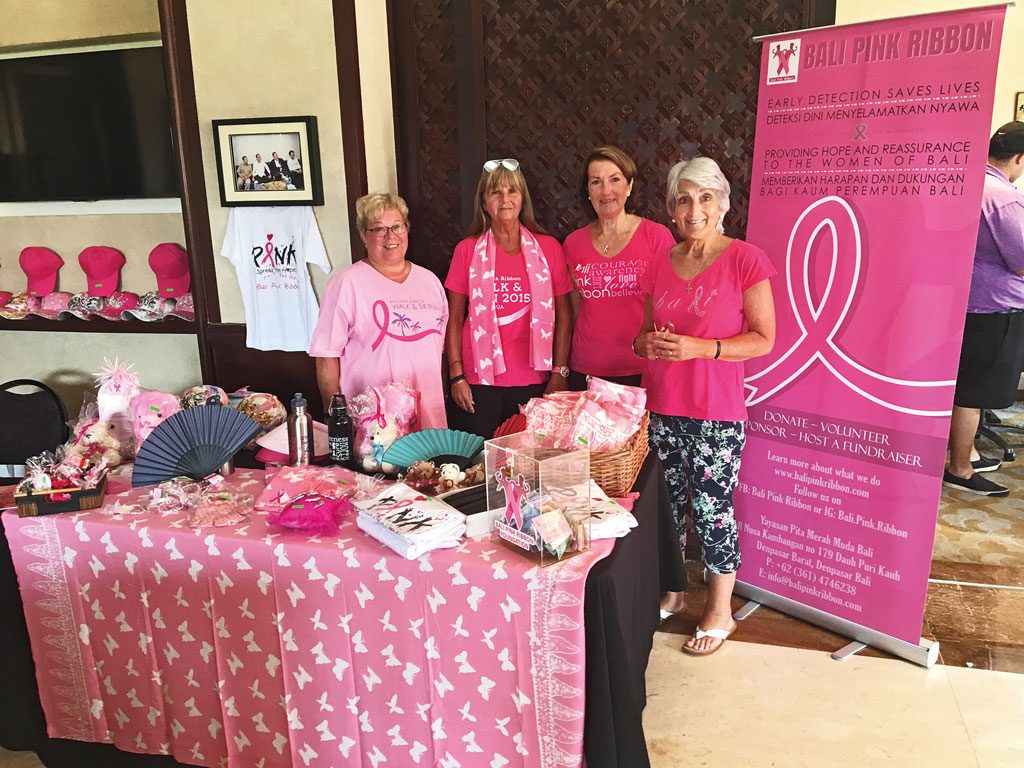
Being a breast cancer survivor, Gaye Warren thought to improve the quality of life of women in Bali by educating them about preventive measures. The birth of Bali Pink Ribbon in 2009 sparked the island’s first breast cancer awareness campaign. In partnership with Prima Medika Hospital, they travel to various regions and community groups in Bali to teach women about the importance of early detection of breast cancer.
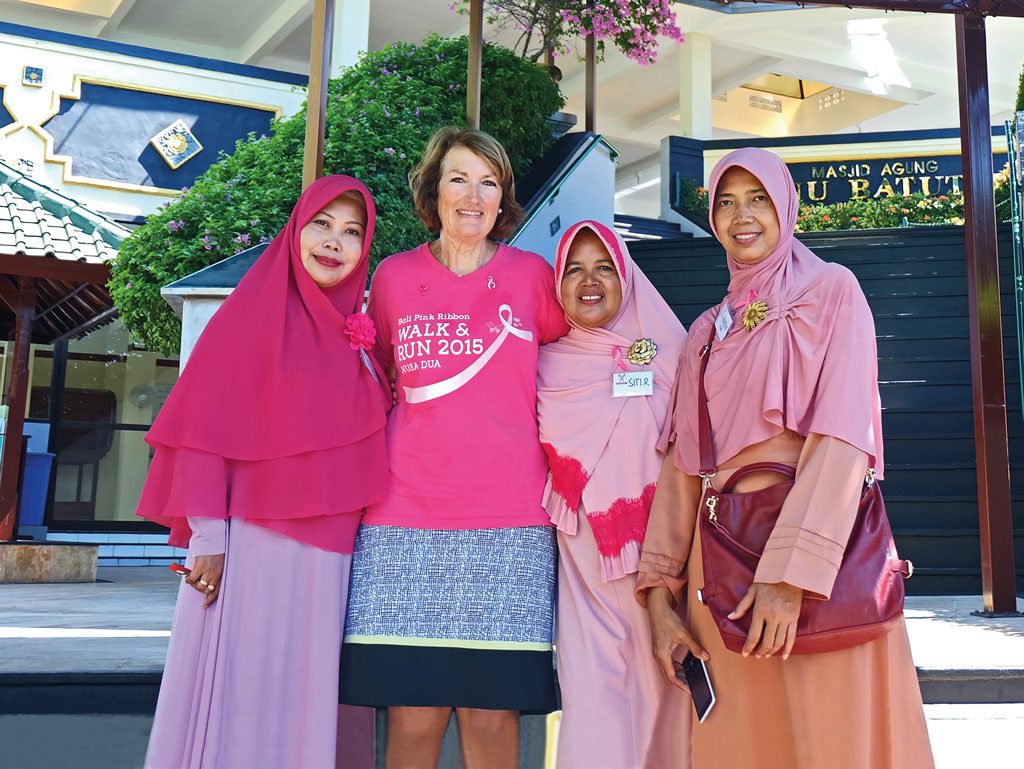
Although its initial focus was exclusive to Bali, the BPR team and medical partners have begun free screening roadshows to the outer islands. In 2017, 100 women on the island of Nusa Lembongan were screened in celebration of Kartini Day (Indonesian equivalent to Women’s Day). BPR’s mission is not limited to screenings, they regularly visit patients requiring emotional support and hold a monthly support group meeting enabling patients and survivors to mingle and share experiences. During the last 10 years, BPR has screened over 4,000 women; discovered 46 patients at various stages of breast cancer and referred them to the hospital; given 220 breast cancer awareness seminars and 20 screening roadshows. Ultimately, however, the BPR team dedicates their time to empower women, how they should prioritise their health, and to value and appreciate themselves.
BASAbali
The Balinese language is exchanged between roughly 3.3 million mouths on this Indonesian island. However, the Bali Cultural Agency did a study that found that the number of Balinese speakers who practise it daily did not exceed 1 million.
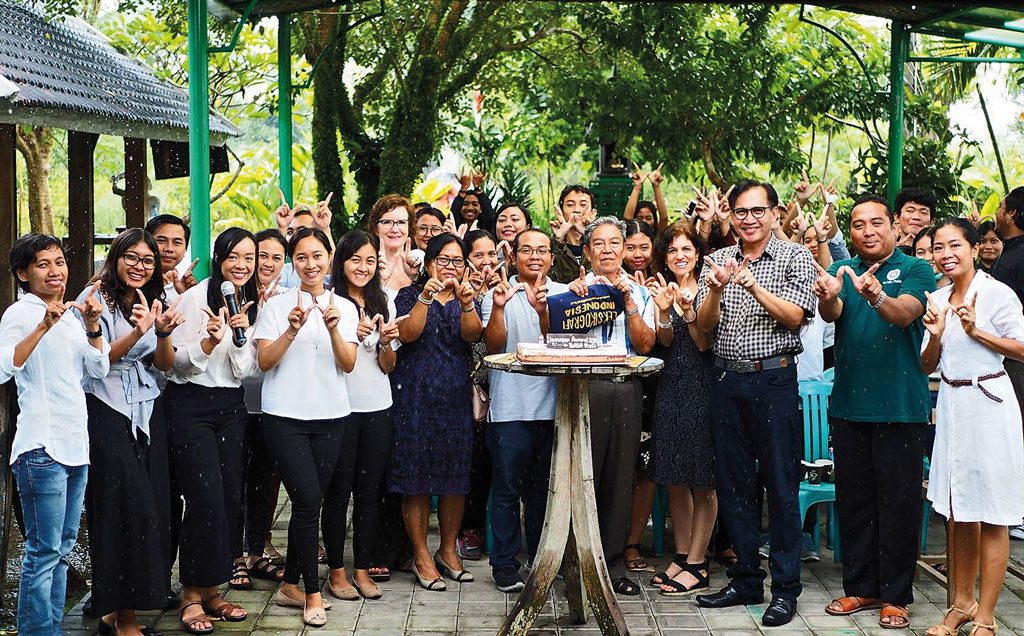
Hailing from the United States, Alissa Stern is firm about sustaining this linguistic treasure. The Harvard Law graduate believes that a language of great culture such as Balinese, deserves recognition and use in the modern world and not be relegated to a language of home. BASAbali has been alive and running since 2011, powered by the belief that all languages act as a vehicle for transmitting culture and the wisdom of that culture. They have assembled a group of both local and international scholars and community members to work towards a synchronised goal: valuing and preserving Balinese.
The BASABali collaboration is pioneering a language revitalisation methodology that is grounded by the belief that linguistic diversity is crucial to human sustainability and will require a significant shift in how we value local languages, primarily in today’s digital world. Establishing a presence in the digital space for the language is one of the main focuses that the team has successfully achieved in parts. The team built a multilingual software to be installed free of charge in schools and community groups, which teaches the endangered Balinese script either in Indonesian or English. Another creation is the Balinese-Indonesian-English Wiki Dictionary and virtual library that they made for the community, which has garnered half a million users since the launch.
Bye Bye Plastic Bags/One Island One Voice
The world has been relying on plastic for centuries, now we are drowning in it. Finally we have come to realise how much plastic waste ends up in our ocean waters that not only affects the environment but adversely damages wildlife, habitats and eventually back to us humans.
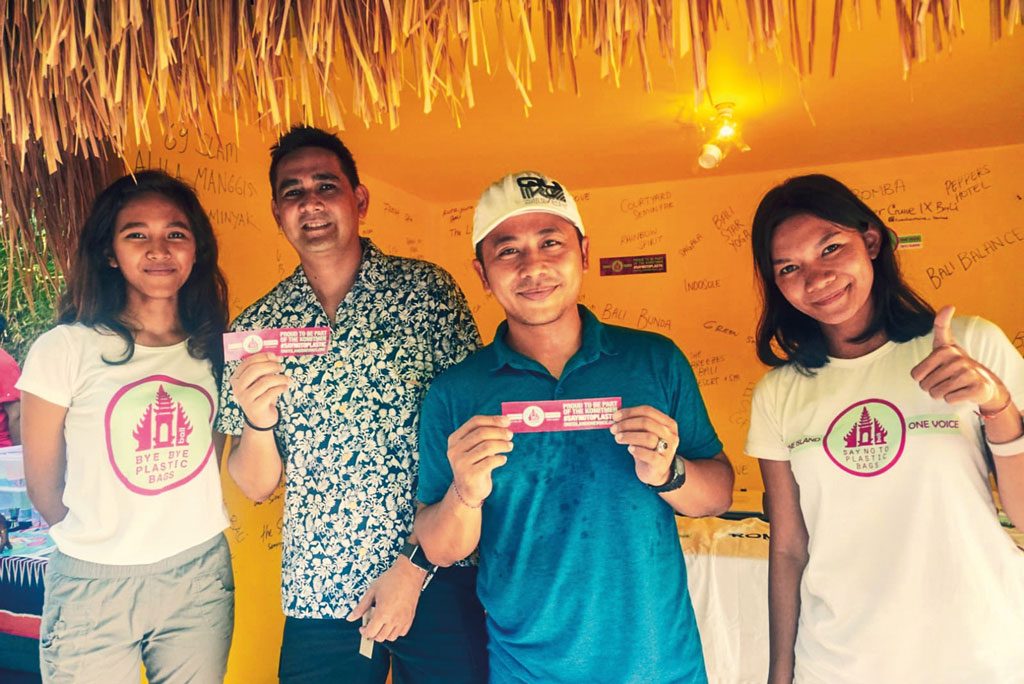
Melati and Isabel Wijsen were barely adolescents when they started saying no to single-use plastics. They began campaigning towards a plastic-free Bali and dreamt of an eventual world free of plastic bags. The sisters raised awareness through the Bye Bye Plastic Bags movement, educating the people of Bali about the long-term dangers of plastic trash and providing solutions to the issue. The community gained positive attention, which ultimately led to the birth of One Island One Voice in 2015 that acts as an umbrella platform for like-minded organisations to empower youth through education, campaigns, and political meetings to achieving one goal: a greener, cleaner world. Their journey started on the paradise island of Bali, to London where they delivered a TED talk, to New York where they appeared at the United Nations, and on CNN Heroes to receive the ‘Young Wonders Award’. One of their latest campaigns is the KOMITMEN – OIOV’s approach for Bali-based businesses to start saying no to single-use plastic bags, coincidentally complementing Denpasar’s ban on plastic bags this 2019.
Rumah Berdaya
There is still a stigma attached to mental illnesses, such as schizophrenia, in Indonesia. A study published in 2019 by the Schizophrenia and Related Disorders Alliance of America believes that schizophrenia is classified more like a brain disease than a mental health problem. In other words, patients suffering from schizophrenia are no different to those fighting other diseases (e.g. brain cancer).
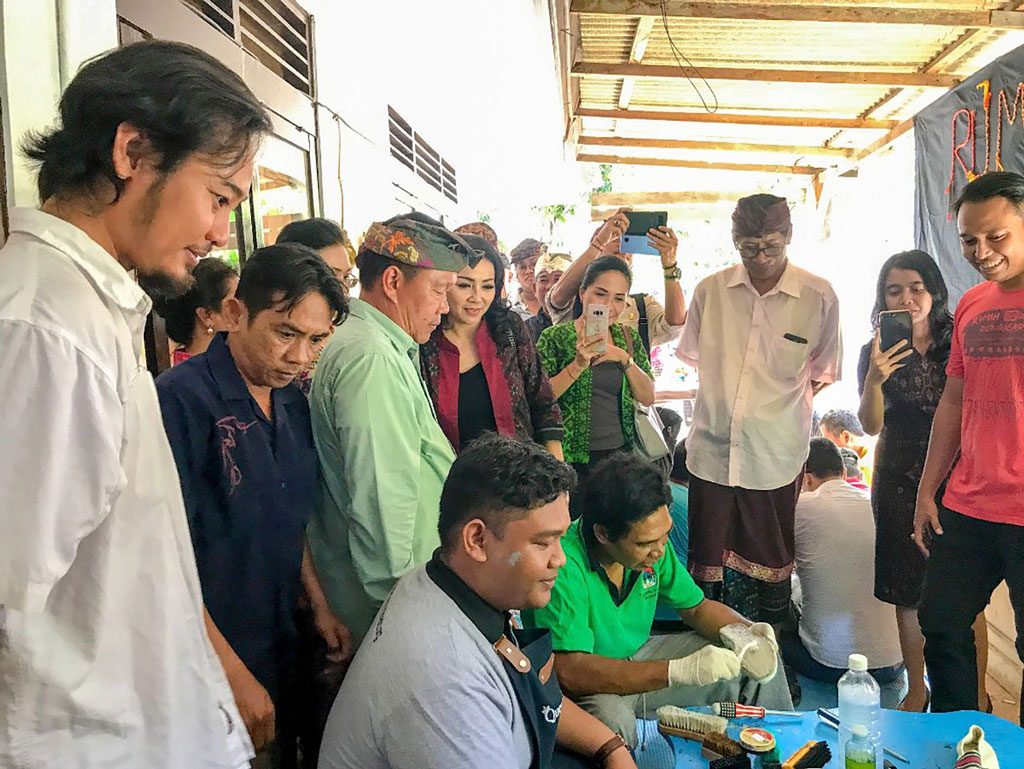
Dr Rai Putra Wiguna S.P.KJ had the right idea when forming Rumah Berdaya in 2016 for his schizophrenic patients. He thought to build a psychosocial rehabilitation centre, which later turned into a supportive community, that would benefit patients especially those who are estranged by their family and friends. The initial plan was to provide a home, or a safe space, for his patients to gradually readjust into the real world where they may not be accepted. As it grew in number and attention, Rumah Berdaya now actively raises awareness about schizophrenia through art and education in hopes to disarm the preconceived notions made by the general public in Denpasar.
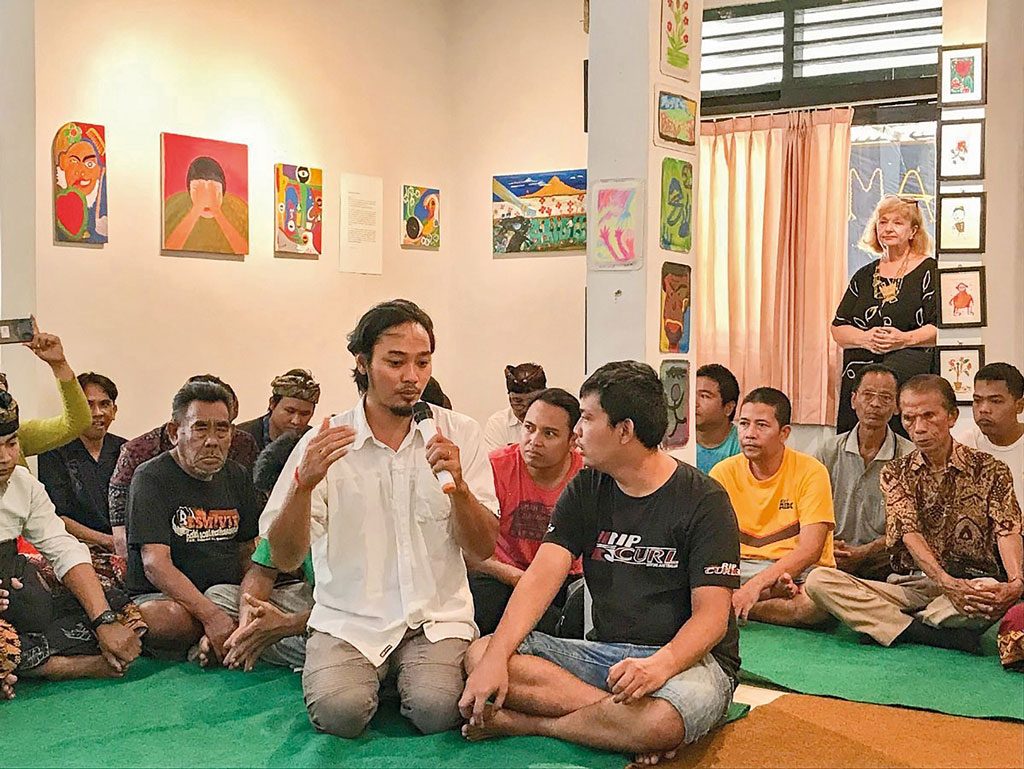
The Schizofriends Art Movement was created with the belief that every person living with mental illness has the ability and right to live an active and fulfilling life. The project showcases its members’ artwork to the outside communities in Denpasar, to develop a more vital relationship with reality. The workshops also enable the community vocationally by providing skills for them to work and live more independently. It is to show people that “our friends” are capable of creating art and expressing through art, just like you. This flagship creative space for people living with schizophrenia is now independently run by a team of psychiatrists and the members of Komunitas Peduli Skizofrenia Indonesia (KPSI) Bali.
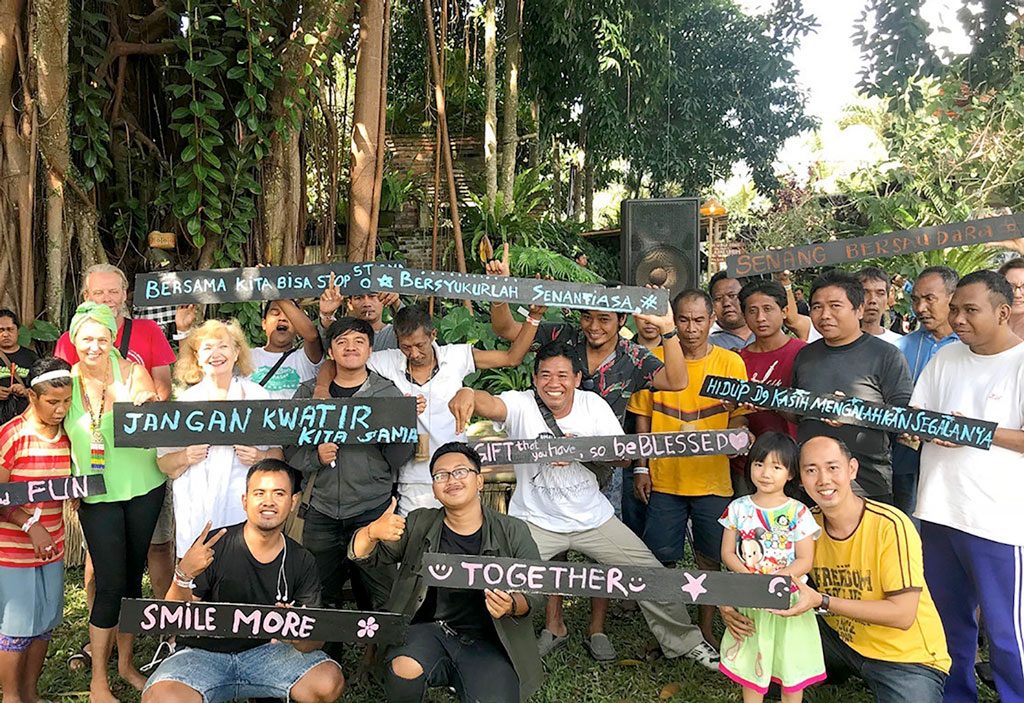
www.rumahberdayadensam.wordpress.com
East Bali Poverty Project
The remote nature and characteristically harsh environment of the eastern region of Bali have made it one of the poorer areas on the island. East Bali hasn’t had the sweet taste of tourism-based revenue that the south is currently blessed with and the residents are still evidently living in poverty. When David Booth witnessed this side of Bali, he decided to put his civil engineering and marketing background to use and dedicate himself to alleviate poverty in poor Indonesian villages. He established The East Bali Poverty Project in 1998 with a mission to improve the lives of the people in Desa Ban (Ban Village).
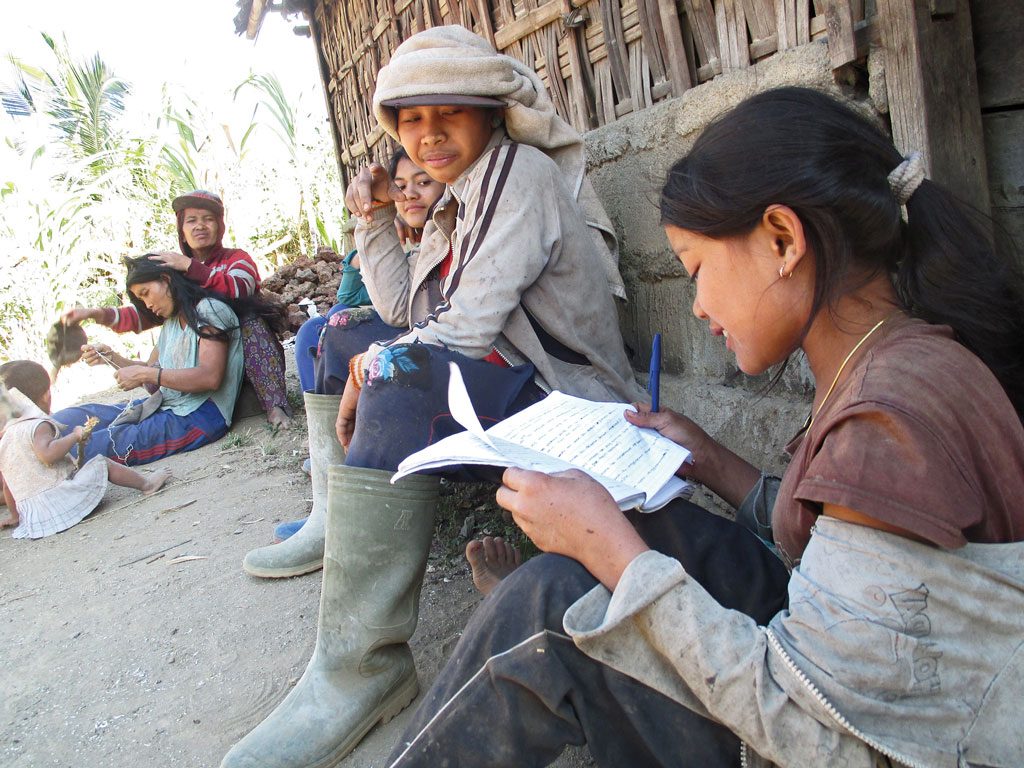
When it first started, thousands of people were living in abject poverty without water, sanitation, roads, schools, health facilities, and electricity; illiteracy was up to 100%; malnutrition and iodine deficiency disorders (IDD) were endemic. By 2018, they had 6 schools built in the most remote hamlets and educated more than 1,200 children; established 27 posyandu (community health posts) serving more than 3,000 families; providing clean and safe water for more than 2,000 families, as well as building toilets for 1,500 families. However, children’s education is still the key priority. They designed literacy programmes, curriculums for students to learn about nutrition, hygiene, sanitation, good health practice, environmental education, arts, crafts, and music. EBPP now urgently needs funding for the children in two of their most remote schools of Jatituhu & Pengalusan, whose communities rely on EBPP schools to provide their children’s education.
You can find full details of our GlobalGiving crowdfunding campaigns to fund these students and their teachers on
www.eastbalipovertyproject.org
or call them at 0361 410071.
Niskala Bali
The thriving tourism industry isn’t all to blame for Bali’s waste problem. There are over 3,000 ceremonies per year on the island and reportedly around 100 kilograms of trash is produced from a single ceremony. Although the Balinese continue their ways in dedication to the philosophy of “Tri Hita Karana” (the harmony between God, people, and nature), 75% of the youth feel that it no longer applies during ceremonies and the harmony with nature is absent. Additionally, the local people’s ways of disposing of the waste are outdated and harmful to the environment (e.g. burning or reckless dumping).
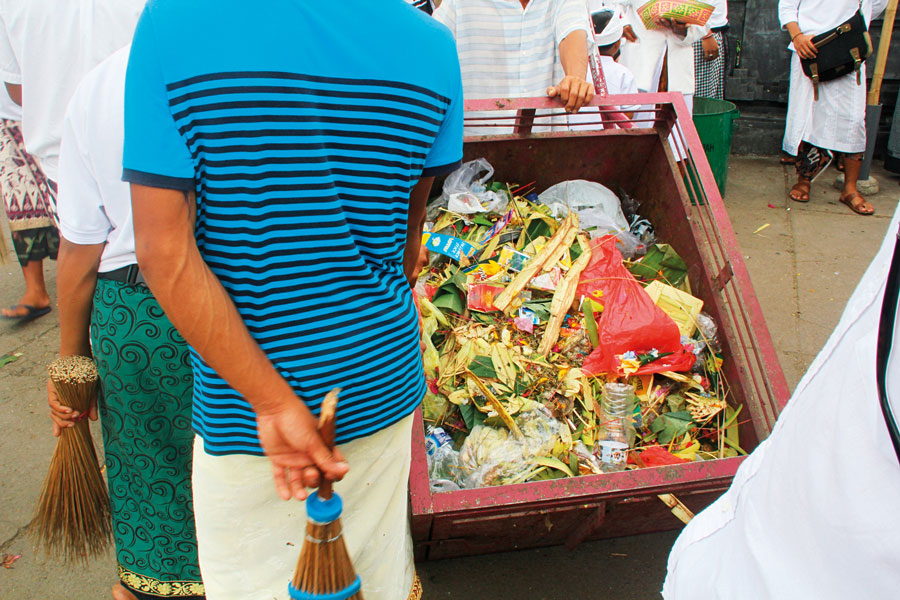
The issue sparked a movement in 2017 when Abid Kamalsyah and Wisakananda Pradipta took action and launched a waste management system for Balinese ceremonies. Niskala Bali aims to create zero waste ceremonies by setting up proper waste disposal, collection, and removal, as well as educating the community regarding waste management. They are eager to solve Bali’s waste problem through a cultural approach.
Their pilot project in Pura Desa Sibangkaja trialled a waste separation method by categorising the waste into canang (offerings) and plastic during Galungan and Kuningan. They managed to collect 300 kilos of offering waste and 15 kilos of plastic waste to be delivered to a composting and recycling station in Kertalangu. They plan to magnify their service by approaching more temples and simultaneously educating and empowering the community to better their waste management in the future.
Bali Animal Welfare Association
Although ongoing studies have not yet concluded the exact heritage of the Bali dog, it is proclaimedto be a symbol of the Balinese heritage by activists and animal lovers alike. These creatures are known to be kind and intuitive, and most of all, loyal.
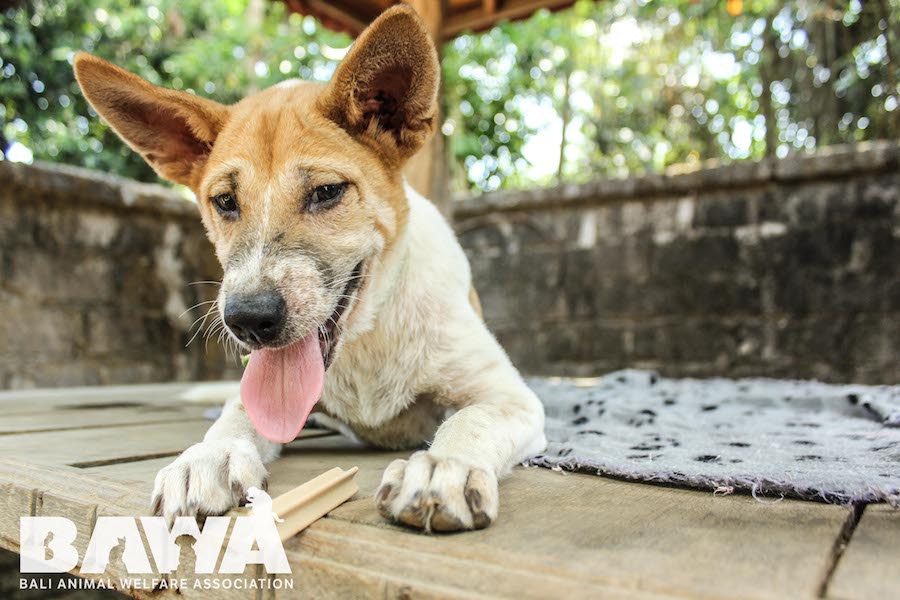
After decades of rescuing animals informally, American resident Janice Girardi established a non-profit organisation dedicated to save, protect, and improve the lives of all animals in Bali and beyond. Bali Animal Welfare Association was established in 2007 whose vision is for all of Bali’s villages to be their own animal sanctuaries. Janice is also very committed to saving and protecting the threatened indigenous Bali dog, which is genetically unique, highly intelligent, and of significance to science, especially from indiscriminate killing and the barbaric dog meat trade. Over the years, BAWA has developed and continues to provide numerous service programs, from humane population control and disease control to running extensive education and advocacy programs for sustainable improvement to animal welfare.
During the rabies crisis, BAWA spearheaded the island-wide vaccination of dogs in order to achieve herd stability of 70% vaccination coverage. By 2011, 270,000 dogs were vaccinated, a 75% reduction in human deaths recorded, and an 85% reduction in dog rabies cases confirmed. Together with Udayana University and the International Fund for Animal Welfare, BAWA has created Program Dharma to establish a community-supported, sustained effort that mitigates the threat of rabies in humans and dogs. Additionally, BAWA’s Emergency Response and Rescue saw the team scavenging through Mount Agung and Lombok to help abandoned dogs as well as feeding dogs whose owners can’t afford to buy dog food. They also take pride in their Bali’s only free 24/7 ambulance service, which rescues and treats more than 1000 animals in distress every year. BAWA is currently active in their extensive education program, teaching 100,000 elementary school students in Denpasar and Badung this academic year about compassion and responsible dog ownership, which is sponsored by Dogs Trust Worldwide.
R.O.L.E. Foundation
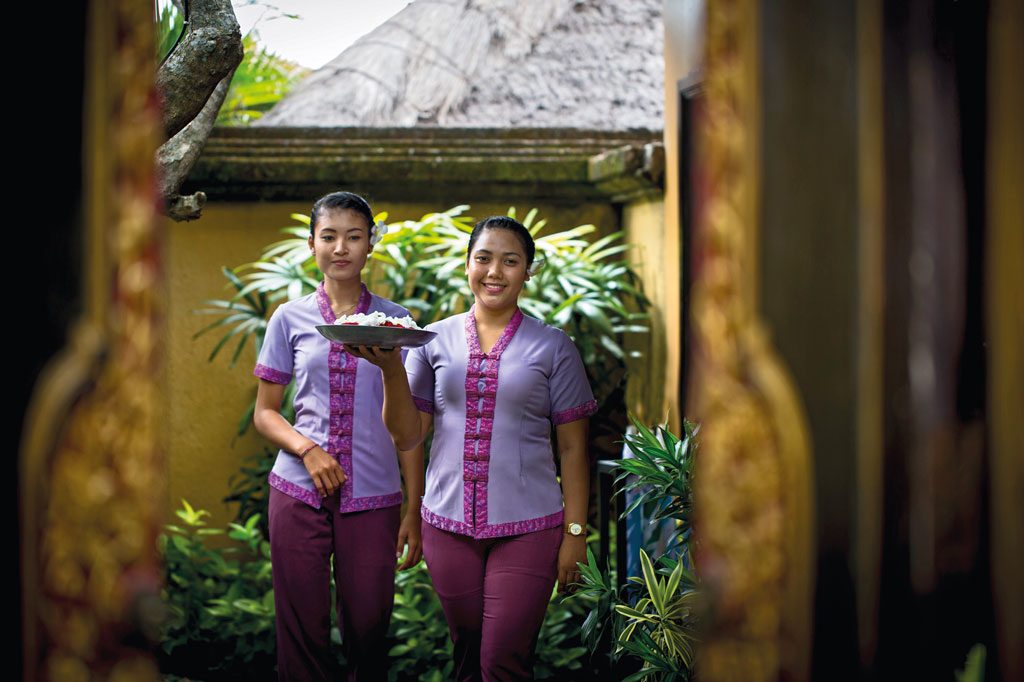
Many people in Indonesia still practise antiquated systems and waste management remains a primary issue that the country is facing. The nation produces 130,000 tons of solid and liquid waste daily due to burning or illegally dumping of waste, which enters the oceans and threatens any chance of a sustainable future.
Mike O’Leary founded R.O.L.E. Foundation in 2007 to develop educational training to increase skills, environmental sustainability, and reduce poverty. The Community Environment and Skills Centre supports the creation of sustainable jobs for underprivileged people living in coastal communities, by educating them to create products that can be sold without affecting the environment. All their projects work towards a more sustainable Bali in the future, such as eco-eco-friendly initiatives ‘Zero Waste to Oceans’, Beach Cleaning Training, and more.
One of Mike’s programmes, Bali WISE reflects a sustainable business model by breaking the cycle of poverty and empowering marginalised women. Unskilled women in Bali typically get pregnant earlier, face gender bias, are open to manipulation (e.g. prostitution), and are expected to continue their cultural duties versus the need to contribute economically. Bali WISE removes the barriers preventing disadvantaged women to access further education and secure work. With a six-month intensive course providing free education in English, Bahasa Indonesia, IT, hospitality and business skills, it has helped to place more than 800 women in gainful employment since 2012 and will train 120 disadvantaged women this year.
www.rolefoundation.org
www.baliwise.org
Coral Triangle Centre
It’s vital that we maintain the sustainability of our rich flora and fauna on land and under the sea. Many years ago, the Indonesian province of Papua was crowned the earth’s most diverse marine life and many of us hope for it to retain its title. This should remind us about the importance of preserving Indonesia’s rich marine biodiversity.
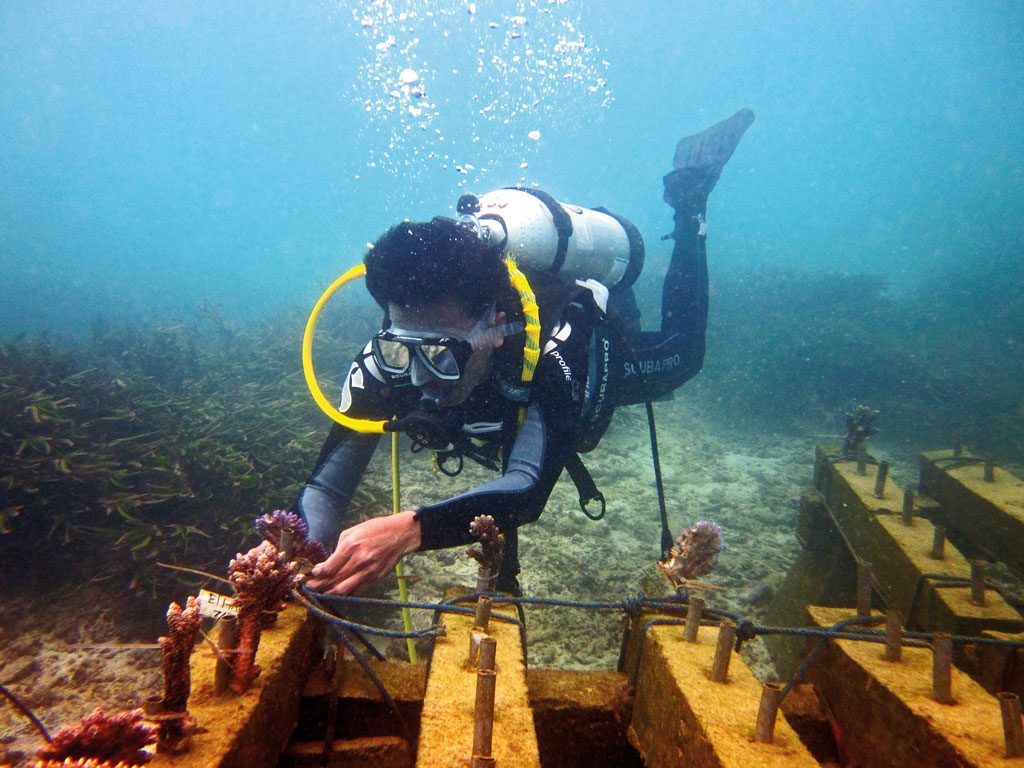
Marine ecologist Rili Djohani began her journey in 1989 as an accomplished diver who had logged long hours underwater in the North Sea, the Mediterranean, and the Caribbean. Her eyes were open to the otherworldly beauty of underwater life that she pledged to guard the planet’s lungs in the ocean: coral reefs. Together with George S. Tahija, Indonesian businessman committed to ocean protection, she formed Coral Triangle Centre (CTC) in 2010 to ‘inspire and train generations to care for coastal and marine ecosystems.’ The centre now provides training on sustainable fisheries and marine protected area management to build local capacity in managing the Coral Triangle’s marine resources.
In Bali, they teamed up with the coastal communities in Nusa Penida Marine Protected Area (composed of Nusa Lembongan, Nusa Ceningan, and Nusa Penida) to facilitate joint patrols, conduct annual scientific surveys, monitor coral reef health, assist infrastructure development, promote sustainable marine tourism, support scientific research on the island, and more.
Merah Putih Hijau
To approach Bali’s waste management issue, Sean Nino Lotze and Maitri Fischer birthed the idea of a separation system to manage materials efficiently whilst simultaneously creating a set of principles that local villages can easily enforce.
Merah Putih Hijau was formed in 2016 because of the demand and necessity for a community-owned waste management infrastructure. Through education, they emphasise the importance of waste separation. For example, dry materials if mixed with wet materials become contaminated and cannot be recycled. The term Merah Putih Hijau (Red White Green) was coined to categorise the materials into Red (Plastic and Paper), White (Metal and Glass), and Green (Organic).
The team are now focusing on their pilot project in Pererenan. The short-term goal is for the facility to be self-sustained with half of the village community participating, while the long-term plan is to create a working template that can act as a benchmark in the villages across the island. MPH is dedicated to going on this ‘marathon’ of consistency for recycling rates to grow within the community and the people around it.
Mitra Bali Fair Trade
Behind the swanky Seminyak shops and attractions, there’s more to Bali under the surface. It’s easy to ignore the undercurrent issues of Balinese traditions, one of which being women in poverty due to patriarchal patterns still being injected into the local customs.
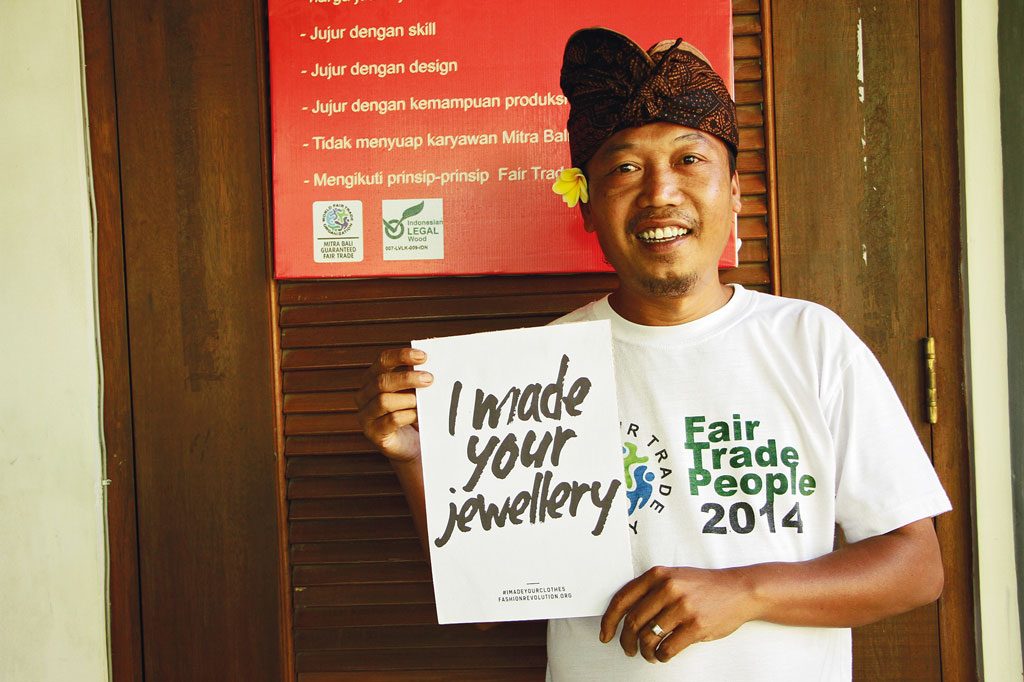
Denpasar born and bred Agung Alit thought a cultural shift was needed. Whilst corporate businesses have clear, profit-based objectives without putting into consideration the environment, social, political, and gender equity issues, Fair Trade works for a better future of the staff, artisans, and the planet. He formed Mitra Bali Fair Trade in 1993 to support artisans and most importantly prioritising the women of Bali, who are looked at as second class citizens in Bali. Mitra Bali has been actively participating in Bali’s economic and social development by working to empower a large group of handicraft producers. Their shop is up and running in Central Ubud, however, they work closely with international traders, such as fair trading companies in the UK.
Nearly three decades later, he still practices his 10 Principles of Fair Trade, including transparency, fair payment, no forced labour, no discrimination, good working conditions, respecting the environment, capacity building, and more. It is all based on the aim of poverty alleviation and sustainable development. Every year they hold medical checkups, training on safety and health or staff and artisans, and other training.
Bali Street Kids Project / Yayasan Kasih Peduli Anak
Many children from remote villages in Bali are forced to beg in Denpasar or sell items (e.g. postcards, bracelets) in high tourist traffic areas. They are thrown onto the streets at a very young age and are unable to attend school needing to earn income for their families. These kids are illiterate, malnourished, and often abused. When they reach puberty, girls frequently turn into prostitution and boys become ‘bosses’ to younger siblings.
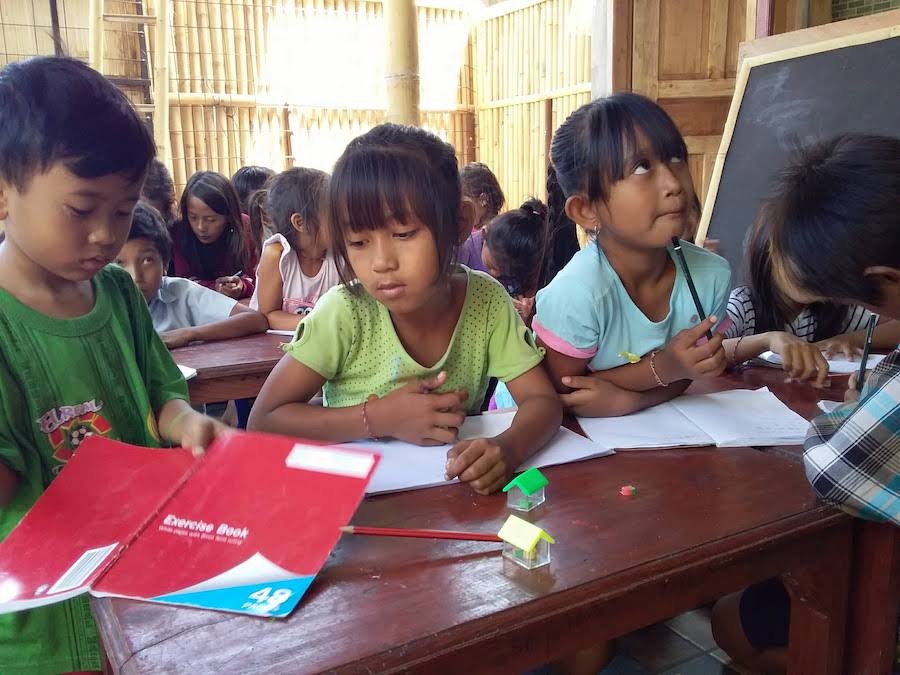
Putu and Michael conceived Yayasan Kasih Peduli Anak (Bali Street Kids Project) in 2007 to make a difference in these children’s lives. The orphanage started when Putu came across a sick girl on the street and decided to give her and two friends shelter at home. Today, Putu homes street kids and disabled children at the orphanage who are receiving the education they never had. Some expat community members also assist with various life-enrichment and learning activities for the kids. YKPA has been improving the lives of children beggars providing ‘in-the-street’ learning and formal schooling opportunities for those who are hungry to learn. The organisation strives to get all street kids to learn how to read, write, do maths, and develop a skill, but limited funding prevents the development of simple projects. YKPA today also cares for deaf, blind, and children with serious medical problems. Today, YKPA cares for disadvantaged children with various problems.









